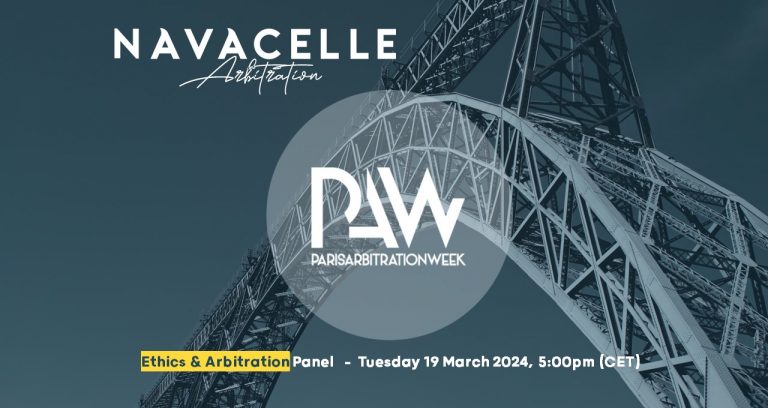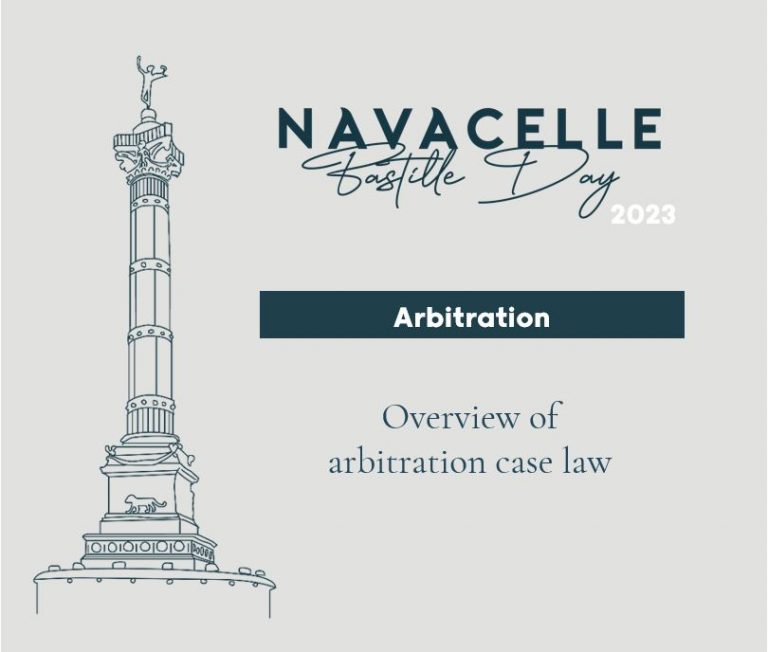Executive summary
International economic sanctions have increasingly affected commerce over the last decades and, consequently, have now become a frequent staple of international arbitration disputes. Accordingly, arbitral tribunals have had to examine their scope and consequences in settling commercial disputes. However, because of the public law nature of sanctions, questions related to their impact on arbitration proceedings have legitimately been raised. While the arbitrability of disputes has not been affected by international sanctions, their overriding mandatory nature has raised questions as to whether these rules may form part of public policy and to what extent compliance of arbitral awards towards international sanctions should be assessed and reviewed by domestic courts.
Abstract
The recent geopolitical context has highlighted the importance of international economic sanctions as a tool of political and economic disputes resolution method. These measures which have become frequent over the past decades are specifically aimed at affecting trade and commerce and, as such, may form part of commercial disputes, especially when involving States or State entities. As such, arbitrators and parties have had to take these rules into account, even though their purpose and wording – as international public law instruments – do not address the management of their consequences on contractual relationships. Arbitral tribunals have had to assess whether these international sanctions necessarily had to be taken into account, as part of the lex contractus or as overriding mandatory rules, whether these rules affected their jurisdiction or the arbitrability of the dispute, whether they form part of international public policy and to what extent the solution of the award they render is affected by the imperatives of applicable sanctions. In controlling arbitral awards, reviewing courts have also had to assess the validity of awards in light of these sanctions, notably on the basis of international public policy. This article is aimed at reviewing and comparing how courts, in various jurisdictions and important arbitration fora, notably in France, the United States of America, Switzerland, but also in Quebec, Italy, Germany, Austria or in the Netherlands, have interpreted international sanctions as overriding mandatory rules and/or public policy and how they examine arbitral awards when there are links with international sanctions to determine whether they comply with public policy.
Introduction
International sanctions may be defined broadly as “measures of an economic – as contrasted with diplomatic or military – character taken to express disapproval of the acts of the target or to induce that target to change some policy or practices or even its governmental structure”.[1] Economic sanctions aim to restrict trade and commerce, i.e. the flow of services, commodities and finance.[2] They can take the form of general trade restrictions of importations and exportations, select restrictions (e.g. on military equipment, weapons, etc.), restrictions on investments and transfer of funds, or sanctions on specific entities or individuals such as asset freezes.[3]
International sanctions can be imposed by different entities.
At the top, the United Nations (“UN”) Security Council which can take restrictive measures in order to maintain or restore international peace and security,[4] on the basis of the UN Charter.[5] These sanctions are binding upon UN Member States and supersede any other international obligation of those States.[6] However, they do not have a direct effect into internal law and must therefore be implemented through local legislation.[7] Measures taken by the UN Security Council on that basis range from “comprehensive economic and trade sanctions to more targeted measures such as arms embargoes, travel bans, and financial or commodity restrictions”.[8] As UN Security Council sanctions require a majority decision of the Security Council, including the unanimous vote of the five permanent members thereof,[9] they are described as multilateral sanctions and are often deemed as reflecting an international consensus and constituting transnational public policy.[10] The UN Security Council has taken approximately 30 sanctions regime in the past 60 years, with 15 sanctions regime currently in force.[11]
Other States or entities may also take economic sanctions, either spontaneously or to implement UN Security Council sanctions. For instance, the European Union (“EU”) can impose sanctions consistent with the objectives of its Common Foreign and Security Policy “to bring about a change in policy or activity by the target country, part of country, government, entities or individuals”.[12] Sanctions may be imposed through EU Council Decisions, which are binding on EU Member States, and, as the case may be, depending on the respective competence of the EU and its Member States, through EU Regulations, which are directly applicable in the Member States legal order.[13] The EU also implements UN Security Council Resolutions via EU Council Decisions and Regulations, which help ensure harmonious implementation within the EU.[14]
Other relevant individual frameworks include sanctions taken by the U.S.A., either via Acts of Congress[15] or Executive Orders,[16] the Switzerland Federal Act on the Implementation of International Sanctions of 22 March 2022,[17] the United Kingdom Sanctions and Anti-Money Laundering Act 2018, whereby the United Kingdom can take spontaneous individual sanctions or implement UN Security Council sanctions.[18]
International economic sanctions are both instruments of foreign policy, of a public international law nature, whose aims are to ensure security, with private law effects and consequences on international trade and commerce. They have constituted over the last decades an important feature for the resolution and management of geopolitical issues. As such they have constituted legal and factual elements of international arbitration disputes to be taken into account by parties, arbitrators and local courts. The tension between this public and commercial nature has first raised issues on the possibility to refer disputes affected by international sanctions to arbitration (I). This has generally been resolved by the courts of the jurisdictions examined in this article in favor of arbitrability, meaning that arbitral tribunals may rule on the merits of such disputes and on the consequences of international sanctions on the resolution of the dispute.
This, in turn, leads to a further issue, which is two-fold: that of the public policy nature of international sanctions, which has received different solutions depending on the source of the sanctions and the content of public policy in different jurisdictions, and the examination, at the stage of enforcement or annulment, of arbitral awards under those public policy rules, either under the United Nations Conventions on the Recognition and Enforcement of Foreign Arbitral Awards of 10 June 1958 (the “New York Convention”) or domestic laws, notably to determine whether the ruling of the arbitral tribunal complies with international sanctions which may affect the underlying operation (II).
In conclusion, while the extent of the review performed by the courts of the jurisdictions examined in this article vary in scope – with some performing extensive reviews and others adopting a deferential approach towards the findings of the arbitrators –, they tend to limit the consequences of sanctions on the validity of arbitral awards and have not modified their approach to the new challenges provided by sanctions on arbitration disputes (III).
I. The Arbitrability of Disputes Affected by International Sanctions
Arbitral tribunals and local courts have first examined the arbitrability of disputes in light of the imperative and public law nature of international sanctions. In that respect, case law in the jurisdictions reviewed in this article has generally found that disputes remain arbitrable even if affected by international sanctions. Indeed, the view held in most jurisdictions is that disputes remain arbitrable despite the existence of mandatory or public policy rules.[19] However, parties have sought to challenge the arbitrability of disputes, arguing generally, although with no avail, that international sanctions impaired parties’ ability to submit claims to arbitration (A) or that it rendered the arbitration agreement void or unenforceable (B).
A. The Effect of International Sanctions on the Ability to Submit Claims to Arbitration
The Court of Appeal of Quebec, in a decision dated 31 March 2003, has notoriously addressed the issue of arbitrability of a dispute despite the existence of international sanctions, in relation to the admissibility of claims.[20] The international community had taken international sanctions against Libya for its support of terrorism. These sanctions were imposed by UN Security Council Resolution No. 748 of 31 March 1992 for Libya’s involvement in the Lockerbie and UTA Flight 772 bombings. These sanctions notably imposed restrictions on the provision of aircraft and military material and services to Libya.[21] This regime was supplemented by UN Security Council Resolution No. 883 of 11 November 1993 which imposed more severe restrictions and prohibited Libyan citizens and Libyan entities from entertaining legal claims.[22] These UN sanctions have also been implemented by the EU, notably through Regulation (EEC) No. 945/92 of 14 April 1992 and Regulation (EC) No. 3275/93 of 29 November 1993.
The case involved a dispute between Air France and Libyan Arab Airlines related to a contract for the maintenance by the former of the latter’s fleet. Following the adoption of the sanctions mentioned above, Air France terminated its contract with Libyan Arab Airlines arguing that it was prevented from performing its obligations because of the sanctions. After Libyan Arab Airlines introduced arbitration proceedings, Air France objected to the jurisdiction of the arbitral tribunal arguing that the dispute was inarbitrable, citing specifically to the restrictive measures preventing Libyan entities from entertaining legal claims.[23] The Court of Appeal of Quebec confirmed the award rendered whereby the arbitral tribunal upheld its jurisdiction, ruling that while claims may have been rendered inadmissible, this did not affect the arbitrability of disputes.[24]
Swiss courts have also confirmed the arbitrability of disputes involving international sanctions as it related to the ability to bring a claim, on the basis of Article 177(1) of the Swiss Federal Act on Private International Law which provides that “any claim involving an economic interest may be submitted to arbitration”. The Swiss Federal Tribunal, in the Fincantieri case, ruled on a challenge against an arbitral award rendered in 1991. The dispute related to payment defaults by Italian companies Fincantieri-Cantieri Navali Italiani SpA and Oto Melara SpA to an intermediary for the conclusion of contracts for the supply of military equipment by the Italian companies to the Ministry of Defense of Iraq, in the context of international sanctions taken against this country. These sanctions related to the invasion of Kuwait by Iraq and were imposed by UN Security Council Resolution No. 661 of 6 August 1990 which imposed trade and financial restrictions upon Iraq. This Resolution was supplemented by UN Security Council Resolution No. 687 of 8 April 1991, which notably prevented Iraq or Iraqi entities from entertaining legal claims.[25] These Resolutions have notably been implemented by the EU, through Regulation (EEC) No. 3541/92 of 7 December 1992.
Following the adoption of these sanctions, the Italian companies interrupted payments and, following the introduction of arbitration proceedings by the intermediary, objected to the jurisdiction of the arbitral tribunal, arguing that the dispute was inarbitrable because of the existence of international sanctions. More precisely, the Italian companies argued that the sanctions prevented them from raising claims arising out of contracts concluded with the Government of Iraq and that submitting these disputes to arbitration would violate public policy.[26] The Federal Tribunal did not seek to determine the public policy nature of the sanctions but ruled that its public policy nature would in any event not result in the inarbitrability of the dispute as it did not affect the nature of the claim as “involving an economic interest” in the sense of Article 177(1) of the Swiss Federal Act on Private International Law.[27]
B. The Effect of International Sanctions on the Validity of the Arbitration Agreement
Other jurisdictions have examined the issue of arbitrability as it related to the validity and enforceability of the arbitration agreement. For instance, U.S. Courts have admitted that disputes remained arbitrable despite the applicability of U.S. sanctions. In Belship Navigation, Inc. v. Sealift, Inc., the District Court ruled on a petition for an order appointing an arbitrator in a dispute between the parties.[28] The dispute related to the performance of a charter party agreement of a vessel between Belship and Sealift. Because it appeared that the vessel and its owner had interests in Cuba, which was under U.S. sanctions, Sealift argued that the charter party agreement was null and void. Accordingly, Belship introduced a request for arbitration, which Sealift opposed arguing that the scope of the arbitration agreement did not cover the dispute, that it was void and unenforceable and that enforcement of the arbitration agreement would violate the New York Convention. The District Court rejected every objection in turn. When turning to the argument related to the New York Convention, it noted first that this Convention applied to arbitral awards and not agreements. However, in an obiter dictum, it stated that enforcement of the arbitration agreement would not violate the “most basic notions of morality and justice” and would therefore not be contrary to U.S. public policy.[29]
The Fincantieri case discussed above has given rise to decisions of other jurisdictions. In the dispute opposing the same Italian companies to the Ministry of Defense of Iraq, the companies had introduced proceedings before the Italian courts despite the existence of an arbitration agreement. The Court of Appeal of Genoa, in a decision dated 7 May 1994, ruled, in contrast to the Swiss courts, that the dispute was no longer arbitrable because the international sanctions against Iraq, which rendered the arbitration clause void, prevented the parties from disposing of their rights.[30] It must be noted that, in a decision dated 15 June 2006 related to the recognition of the Court of Appeal of Genoa’s decision in France, the Court of Appeal of Paris rejected the request, ruling that it was rendered in violation of the compétence-compétence principle, by a court which therefore lacked jurisdiction.[31] While French courts have not directly ruled on the arbitrability of international sanctions, French case law provides that international arbitration disputes remain arbitrable in the presence of public policy rules, and that arbitrators have jurisdiction to apply public policy rules,[32] leaving little doubt that they would enforce arbitrability in the context of sanctions.
Disputes involving international sanctions generally appear arbitrable, meaning that the arbitration agreement remains valid and unaffected by the potential public policy nature of sanctions. Arbitral tribunals can therefore rule on the consequences of international sanctions on the resolution of the dispute.[33] However, to the extent that international sanctions can constitute public policy rules, arbitral awards may also be reviewed by local courts under that prism.
II. The Compliance with Public Policy of Arbitral Awards Affected by International Sanctions
As disputes involving international sanctions are deemed arbitrable, this means their impact on the merits of the dispute or on the enforcement of obligations arising out of an award are necessarily assessed by arbitral tribunals. However, because they are of a public nature, arbitral tribunals and State courts have first sought to determine the strength and nature under which these norms should be reviewed or examined, some courts determining that they do not form part of public policy – because they are of a diplomatic and political nature –, while others have assessed their aim and source to determine what type of sanctions should be construed as forming part of public policy (A). At the last stage, one must examine the nature of the review of the awards performed by State courts, which can be more or less extensive: some adopting a deferential approach towards the findings of the arbitral tribunal, while others, notably French courts, tend to perform an extensive review of the implementation of international sanctions by the arbitral tribunal (B).
A. The Public Policy Nature of International Sanctions
International sanctions can be qualified as overriding mandatory rules (or lois de police), that should be taken into account by the judge or arbitrator.[34] Generally speaking, lois de police apply to a legal situation, regardless of the forum or the applicable substantive law. They are defined by the Rome I Regulation as “provisions the respect for which is regarded as crucial by a country for safeguarding its public interests, such as its political, social or economic organisation, to such an extent that they are applicable to any situation falling within their scope, irrespective of the law otherwise applicable to the contract under this Regulation”.[35] To that effect, international sanctions taken by the forum State and sanctions of the applicable substantive law would generally be taken into account in resolving the dispute. Public policy rules refer to a set of principles and values that have to be complied with and against which arbitral awards are examined.[36]
French courts have attempted to define these two notions in the context of international sanctions and to determine to what extent sanctions could form part of French international public policy. To do so, the Court of Appeal of Paris confirmed a previous approach. In the MK Group case, which did not involve sanctions, the Court had first determined that foreign overriding mandatory rules, to the extent that they protect the values and principles which French legal order cannot stand to have misapplied, may form part of French international public policy.[37] In assessing whether the foreign overriding mandatory rule protected the same values and principles as French international public policy, the Court of Appeal noted that a UN General Assembly Resolution provided an international consensus on the relevant issue of sovereignty of a State over its natural resources. Because of this international consensus, it determined that this principle formed part of French international public policy, such that a foreign overriding mandatory rule protecting this principle could be taken into account for its review of compliance with public policy.[38]
In the TCM FR case,[39] the Court examined whether an arbitral award rendered in favor of an Iranian company, NGSC, against French company, TCM FR, in relation to a dispute over performance of a contract for the exploration and production of natural gas in Iran complied with international sanctions against Iran related to the development of the country’s nuclear program. These sanctions were imposed by UN Security Council Resolutions Nos. 1737 of 23 December 2006 and 1747 of 24 March 2007 related to Iran’s development of its nuclear program. This sanctions program imposed trade restrictions for a number of equipment and services related to the nuclear industry,[40] an arms embargo,[41] select asset freezes for entities and individuals related to the nuclear industry,[42] but did not prevent transfer of funds under transactions unrelated to this industry.[43] These sanctions have been implemented in the EU through Regulation (EC) No. 423/2007 of 19 April 2007, Regulation (EU) No. 961/2010 of 25 October 2010, and Regulation (EU) No. 267/2012 of 23 March 2012.
TCM FR notably argued, before the French courts, that by failing to take into account these sanctions, the arbitral award violated French international public policy and should be set aside. In ruling on this challenge, the Court first determined whether each set of sanctions formed part of French international public policy.
It first examined UN sanctions and ruled that, while they were not directly applicable under French law, they were binding upon France, and constituted “foreign if not truly international imperative rules”.[44] In addition to this imperative nature, applying its definition of international public policy, the Court determined that UN Security Council Resolutions because their objective is to maintain or restore international security, provide rules and values that have to be protected in the French legal order and therefore form part of French international public order.[45] It then turned to EU sanctions and similarly found that they were akin to French overriding mandatory rules and because they contributed to maintaining and restoring international safety formed part of French international public policy.[46] In relation to U.S. sanctions however, the Court noted that, because they were contested by French and EU authorities notably because of their extraterritorial effect, they did not reflect an international consensus and did not form part of French international public policy.[47]
Applying the same reasoning, later decisions by French courts have confirmed that UN and EU sanctions formed part of French international public policy and should therefore be taken into account in reviewing arbitral awards. For instance, in the AD Trade case, in a dispute involving EU sanctions against the Republic of Guinea, the Court of Appeal of Paris confirmed that EU sanctions formed part of French international public policy.[48] Similarly, in the DNO Yemen case, the Court of Appeal of Paris also stated generally that UN Security Council and EU sanctions formed part of international public policy.[49] Finally, in the Armamenti case, involving international sanctions against Iraq, the Court of Appeal of Paris confirmed that UN Security Council Resolutions also form part of French international public policy.[50] French law therefore appear to have largely integrated into its public policy the objective of maintaining and restoring international safety, such that legal instruments participating to this objective should be taken into account when reviewing arbitral awards.
Other courts have also examined the imperative or public policy nature of international sanctions. For instance, Austrian courts have recognized the overriding mandatory nature of EU sanctions,[51] but do not seem to have ruled whether they formed part of public policy. The German Court of Justice had also found a contract to be null and void for violation of public policy because it circumvented U.S. embargo regulations.[52] Furthermore, the Swiss Federal Tribunal had also examined, in the Beverly Overseas SA v Privredna Bank Zagreb d.d. case dated 28 March 2001, the nature of UN sanctions in relation to the war in former Yugoslavia.[53] The dispute involved a payment dispute in relation to a weapons transaction to the Republic of Croatia which was at war with Serbian forces. While Switzerland was not a member of the UN at the time, and therefore not bound by UN Security Council Resolutions, the Swiss Federal Tribunal ruled that it should nonetheless examine whether the transaction complied with “universal public order”. The Federal Tribunal held that the principle of non-use of force, established in the UN Charter and in most nations legal systems,[54] was a “supreme value common to all cultural states”. Accordingly, it ruled that “deliveries of weapons or war material to areas where armed conflict is raging or threatening to break out are therefore fundamentally contrary to universal public order” and was based in that case on “worldwide arms embargo issued by the United Nations Security Council” which reinforced this. On that basis, and finding no diverging norm under Swiss law, the Swiss Federal Tribunal found that the transaction was immoral, and no claims could arise thereof.[55]
On the contrary, U.S. courts tend to construe public policy more narrowly. For instance, in the Parsons & Whittemore Overseas Co. v. Société Générale de L’Industrie du Papier (RAKTA) case,[56] the U.S. Court of Appeals for the Second Circuit examined a request for confirmation of an arbitral award under the New York Convention. The underlying dispute involved performance of a contract between RAKTA, an Egyptian company, and Parsons & Whittemore, an American company, after the outbreak of the Six-Day War. An arbitral award had been rendered in favor of RAKTA holding Parsons & Whittemore liable. Before the U.S. Courts, Parsons & Whittemore objected on the grounds of Article V(2)(b) of the New York Convention,[57] arguing that U.S. national policy against Egypt prevented confirmation of the award. The Court held however that national policy did not equate to public policy and was therefore insufficient to prevent confirmation of an arbitral award on that sole basis.[58] This rationale has been applied by other U.S. courts when examining public policy defenses related to economic sanctions.
For instance, in Ministry of Defense & Support for the Armed Forces of the Islamic Republic of Iran v. Cubic Defense Systems, Inc.,[59] the U.S. Court of Appeals for the Ninth Circuit ruled on an objection to the confirmation of an arbitral award in favor of the Ministry of Defense of Iran grounded on U.S. sanctions against Iran. Relying on the Parsons & Whittemore v. RAKTA ruling, the Court of Appeals ruled that the defense of public policy was to be construed narrowly and would only be upheld when confirmation or enforcement of a foreign arbitration award would violate the forum state’s “most basic notions of morality and justice”.[60] The Court ruled that while U.S. international sanctions were an expression of national policy against Iran, these sanctions did not necessarily form part of U.S. public policy in the sense of the New York Convention, and in any event did not supersede the public policy in favor of enforcing arbitral awards. This stance has been widely confirmed by U.S. Courts.[61]
It is certain that international sanctions now frequently form part of the set of norms upon which arbitrators have to rule on a case and are increasingly examined when reviewing awards. However, it stems that courts do not necessarily afford the same value to international sanctions: some, deferring to an international consensus, rule that they form part of public policy, others decide that they reflect diplomatic and political policies and should not affect arbitral awards. In addition to the value afforded to these norms, the standard of review of courts when examining these sanctions can shed some light on the importance of compliance of arbitral awards to these sanctions.
B. The Nature of the Review of Arbitral Awards Exercised by State Courts on the Basis of Public Policy
Arbitral awards are increasingly challenged on grounds of public policy, either under the New York Convention[62] or local laws.[63] Courts have adopted different views in relation to the public policy nature of international sanctions but also proceed with reviews of various extent and scope when ruling on challenges to arbitral awards.
For instance, since French courts have ruled that UN and EU international sanctions form part of French international public policy, they have accordingly performed extensive reviews of awards on that basis, in line with recent case law related to allegations of corruption.[64]
The French Court of Cassation had first upheld an award in the Fincantieri case.[65] The dispute related to the contracts concluded between Fincantieri-Cantieri Navali Italiani and Oto Melara and the Ministry of Defense of Iraq for the supply of war equipment.[66] An award was rendered in 2006 which ruled that the Ministry of Defense’s claims were inadmissible. The Iraqi State party sought to have the award set aside before French courts. The Court of Appeal of Paris rejected this challenge and determined that the arbitral tribunal, by correctly applying the relevant international sanctions to the dispute at hand, did not violate public policy.[67] The Court of Cassation confirmed that, because the sanctions against Iraq prevented them from entertaining any claim and that the dispute at hand was covered by the “no claim” clause of UN and EU sanctions,[68] the ruling of the arbitral tribunal on inadmissibility did not violate public policy.[69] This decision did not examine the substantive public policy nature of the sanctions, but only whether the Ministry of Defense of Iraq had been in a position to discuss the scope of the sanctions before the proper forum.[70] In addition, while it did not clarify the standard of review to be performed, the decision appeared to have examined the relevance of the decision of the arbitrators,[71] although it is unclear whether the court only deferred to the arguments of the arbitral tribunal or performed an examination anew.[72]
The Court of Appeal of Paris, in later cases, seems to have confirmed the extensive standard of review when controlling the compatibility of international sanctions with public policy. As stated, in the TCM FR case, performance of contracts between a French company and an Iranian company had been affected by sanctions taken against Iran.[73] TCM FR argued before the French courts that, by giving effect to a contract affected by these sanctions, the arbitral award violated public policy. However, this objection had not been raised by TCM FR before the arbitral tribunal.[74] In its decision, the Court confirmed that, when examining whether an award complied with public policy, it did not review the findings of the arbitrators but only whether the solution of the award did not amount to an “effective and concrete” violation of public policy. Accordingly, the Court ruled that it should only review the concrete effect of the sanctions on the solution of the award, such that the sole fact that the arbitral tribunal had not taken the sanctions into account was irrelevant for its examination.[75] Furthermore, the Court had the power to review the claim of violation of public policy in fact and in law, such that it was not bound by the findings of the arbitral tribunal (or lack thereof).[76] On that basis, the Court reviewed whether the sanctions applied ratione materiae and ratione temporis. It determined they were not applicable and the fact that they were not taken into account by the arbitral tribunal in the award did not constitute an effective and concrete violation of French international public policy.[77]
In the AD Trade case, the Court of Appeal of Paris confirmed that a public policy defense can be raised for the first time before the annulment judge, that this defense can be raised by the party affected by the sanctions, here the Republic of Guinea, and explained that compliance with policy is to be assessed at the time of the reviewing judge’s ruling. On that basis, because the relevant sanctions had been lifted, the Court determined there could be no violation of public policy.[78] However, the Court decided to perform an extensive review into the applicability ratione materiae of the sanctions, noting that a violation of public policy should be “characterized”, and reviewed in detail the scope of the sanctions for that purpose, even relying on two expert reports prepared for these proceedings before the Court of Appeal.[79]
Furthermore, in the DNO Yemen case, the Court of Appeal of Paris examined the scope of UN Security Council and EU sanctions related to the situation in Yemen. In that case, an arbitral award had been rendered in favor of the State of Yemen and State-owned company Yemen Oil & Gas Corporation (“YOGC”) in relation to an oil and gas project in Yemen. Before the French courts, the petitioners argued that the award would indirectly benefit entities under sanctions. The Court noted that the Ministry of Oil and Minerals of the Republic of Yemen and YOGC were not affected by the sanctions but examined in detail the scope of said sanctions to determine whether, at the time of the judge’s ruling and on the basis of “serious, specific and consistent” evidence, the recognition or enforcement of the award is not likely to violate the sanctions by directly or indirectly providing assets to persons or entities listed under sanctions regime.[80]
Recent French case law therefore demonstrate that the applicability of international sanctions should be assessed on a case-by-case basis. Although the intensity of the review performed by the judge had not been clarified by the TCM FR court, it performed a careful examination of the implementation of the sanctions.[81] However, in the AD Trade case, the Court clarified that it examined whether the violation was characterized, therefore applying a high standard of review, and the DNO Yemen case confirmed that this examination is based on specific and concrete evidence. Although courts should be mindful of the risk of a review on the merits, the review adopted by French courts in the abovementioned cases appear to comply with the nature of the examination of compliance with public policy, which, some authors argue, calls for a strict control of the most important principles and values and important investigative and examination powers to protect them.[82]
Despite applying a narrow notion of public policy and generally refusing to apply this ground when sanctions have been involved,[83] U.S. Courts appear nonetheless to review the scope of international sanctions and how they operate, although adopting a deferential approach towards the findings of the arbitral tribunals.[84] For instance, in Ministry of Defense & Support for the Armed Forces of the Islamic Republic of Iran v. Cubic Defense Systems, Inc.,[85] the Court of Appeal ruling on a request for confirmation of an arbitral award which found a U.S. company liable to pay damages to the Ministry of Defense of Iran determined that U.S. sanctions against Iran prohibited exports of equipment and payments for the benefit of Iranian entities without authorization by U.S. authorities but did not prevent confirmation of arbitral awards. It also determined that, to the extent the sanctions authorized legal representation of Iran and related entities before U.S. courts, they did not prohibit dispute resolution and did not require refusing confirmation of arbitral awards. In another case involving U.S. sanctions against Iran, the Court confirmed the award but modified a portion thereof that required the return of equipment to Iran, which would be in violation of U.S. sanctions.[86] A similar finding was made in National Oil Corp. v. Libyan Sun Oil Co.[87] The Court determined that the sanctions against Libya did not prevent confirmation of the award, notably because the U.S. had given permission to Libya to bring the action before U.S. Courts. On that basis, confirmation of the award did not violate public policy. Furthermore, in MGM Productions Group, Inc. v. Aeroflot Russian Airlines[88] and Ameropa AG v. Havi Ocean Co. LLC[89] the Courts examined in detail the scope of U.S. sanctions against Iran and determined that they were not applicable to the dispute at hand.[90]
The practice of other jurisdictions seems to evidence less extensive reviews. For example, the Swiss Federal Tribunal in a decision dated 21 January 2014 recognized an arbitral award ruling on a dispute between an Iranian company on one hand, and, on the other hand, a Swiss company and Israelian companies over the delivery of crude oil, which had found the latter liable to pay damages to the former.[91] The defendants objected to the recognition of the award due to UN, EU and Israeli sanctions against Iran. The Federal Tribunal determined summarily that the “abstract considerations concerning international policy” and “general statements as to the reach of international law over domestic law” did not “enable the court to understand why setting aside the object raised by a Swiss company (the Appellant) to an order of payment concerning the amount awarded to an Iranian company (the Respondent) pursuant to an enforceable arbitral award would be incompatible with Swiss public policy when the latter sought payment by its contractual counterpart of unpaid invoices concerning shipments of oil delivered 34 years earlier.” In proceedings related to the enforcement of an award in the Crescent Petroleum v. NIOC case, Greek courts seem to have performed a limited review of the scope of sanctions against Iran, deferring to the findings of the arbitral tribunal,[92] while Netherlands courts ruled that this constituted a material issue to be decided by the annulment judge and not the enforcement judge.[93]
As a middle ground, other decisions related to enforcement of arbitral awards, while not refusing outright said recognition and enforcement, tend to take into account the existence of sanctions in order to adapt enforcement. For instance, the Austrian Supreme Court, ruling on the enforcement of an Austrian monetary judgment against an Austrian entity in favor of a party subjected to EU sanctions against Syria, determined that while the sanctions did not extinguish the payment obligation, it rendered it temporarily unenforceable.[94]
International sanctions now forming a central issue of fact and law in commercial disputes require careful scrutiny from arbitral tribunals. Because they address important issues of public law, if not public policy, they are also increasingly taken into account by domestic courts reviewing arbitral awards, either when ruling on the validity of the award or its enforcement. Notwithstanding the level of review adopted by reviewing courts, it appears that their scope must be assessed to ensure that they do not incorrectly prevent dispute resolution and enforcement, in line with their material and temporal objectives.
III. Conclusions
International sanctions, public law instruments of a diplomatic and political nature, significantly affect trade and commerce. As such, they can disrupt contractual and commercial relationships, leading to disputes to be resolved by arbitration as the preferred method of commercial dispute resolution. Under the current geopolitical context, parties and arbitral tribunals are therefore increasingly required to take this evolving landscape and address consequences of international sanctions – which hardly form a unified and coherent body of instruments, and often involve examining different sets of measures taken at a national, regional or international level – on the merits but also on the validity of arbitration as a means to resolve such issues. This article has thus sought to examine how arbitral tribunals and State courts address the challenges posed by sanctions regime on the validity of arbitration and determine whether this dispute resolution method remained relevant in that context.
It first examined how challenges to the arbitrability of disputes involving international sanctions are addressed in several jurisdictions. It noted that parties have sought to avoid arbitration by arguing that sanctions prevented referring claims to arbitration, because of specific provisions related to prohibition against entities listed to entertain legal claims, their public policy nature or because sanctions had the effect of rendering arbitration agreements void or unenforceable. To a large extent, case law examined in this article dismissed those arguments and favored referring claims to arbitration in that context, noting that the potential applicability of international sanctions to commercial disputes did not prevent parties to dispose of their rights and did not affect alternative dispute resolution. This is in line with international arbitration standards related to the notion of autonomy, which allow parties to refer their disputes to arbitrators and those arbitrators to rule on those claims even if affected by public policy issues.
The article then examined the issue of compliance of the arbitral award with international public policy, assessed by State courts at the challenge or enforcement stage, which poses additional issues for stakeholders. Indeed, the impact of sanctions on a dispute may raise questions about compliance of the award with shifting public policy, as sanctions reflect a fundamental modification of geopolitical norms.
As arbitral tribunals rule on disputes involving international sanctions, they are required to determine the nature of these sanctions and their prevalence in the case at hand. Because there are different sets of sanctions, taken by different jurisdictions, arbitral tribunals and State courts are required to determine which sanctions should apply to the proceedings, the substantive law and to the enforcement of the award. In that respect, French courts have recently sought to systematize this assessment. It determined that EU and French sanctions uncontroversially formed part of French international public order and constituted overriding mandatory rules. It also ruled that UN sanctions, as they reflected an international consensus and aimed at maintaining and restoring international security, contained rules and values protected in the French legal order. A similar position was adopted by Swiss courts. However, sanctions taken by other jurisdictions did not necessarily have this status, and as such, would not necessarily be relevant for control of compliance of an arbitral award to international public policy. On the other side of the spectrum, U.S. courts tend to construe public policy more narrowly and determined that sanctions concerned issues of national policy and did not necessarily form part of international public policy in the sense of the New York Convention, which is constituted of the “most basic notions of morality and justice”.
After having examined what forms part of public policy, the article examined the nature of the review of arbitral awards when it comes to compliance with international sanctions. Here again, French courts have proceeded with an extensive review of awards on this issue, reexamining effectively and concretely whether the solution of the award complied with public policy, in that case, the relevant set of sanctions. U.S. courts also tend to review the scope of international sanctions in detail, without performing a de novo review. Other courts, such as the Swiss courts tend to perform a less extensive review and to be more deferential towards the findings of the arbitral tribunals.
Jurisdictions reviewed in this article have not adopted a comprehensive manner in addressing the impact of international sanctions and have varied in their approach. As international sanctions regime become more and more integrated, this may, however, lead to increased harmonization from States in the way arbitral awards are reviewed.











